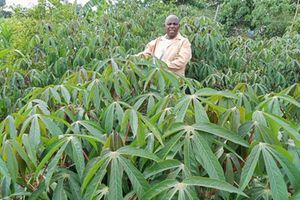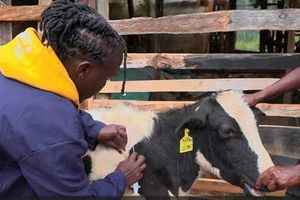
Agriculture CS Andrew Mwihia Karanja during the interview at Kilimo House, Nairobi.
Dr Andrew Karanja was named the Agriculture and Livestock Development Cabinet Secretary weeks ago. He comes in at a time when farming is shifting towards technology. He spoke to Sammy Waweru.
What are your priorities as CS and how do they align with the government’s overall agricultural policy?
My primary objective is to ensure food and nutrition security for Kenyans and to make agriculture competitive enough to attract local and international investment. We’ll accomplish this by implementing the priorities outlined in the Bottom-Up Transformation Agenda (BETA).
We will work with counties, farmers and private sector players to reduce food imports. The country spends nearly $4 billion (Sh520 billion) on importing foods like rice and oil. This depletes our foreign exchange reserves and does not create jobs in farming. The ministry will focus on interventions that promote local production of rice and oil crops.
Since agriculture is devolved, I will work with counties and the Council of Governors (CoG) to strengthen inter-governmental relationships and coordination. This is aimed at improving services. My office and the CoG are planning an intergovernmental consultative meeting in October, followed by an Inter-Governmental Forum for agriculture.
I also plan to implement an effective communication strategy to inform farmers, stakeholders and the public about interventions and activities by the ministry. This will involve a well-designed communication approach that targets mainstream and social media.
How will you address the challenges facing small-scale farmers in terms of accessing markets, inputs and credit?
Small-scale farmers accounting for 70 perto contributecent of production. Supporting them is essential for achieving national food and nutrition security. I will work with state departments and county governments to organise farmers into cooperatives and associations. These groups will ensure produce volumes are sufficient to secure the best prices. For exports like tea, coffee and horticulture, we will strengthen our presence in existing markets and explore new international opportunities. We will enhance market information access through the Agricultural Information Resource Centre (AIRC).
We intend to utilise data from the Kenya Integrated Agriculture Management Information System (Kiamis) to offer targeted subsidies for fertiliser, seeds, breeding stock, pesticides and agrovet supplies. We plan to transition to e-vouchers and partner with counties to establish convenient distribution points.
We will engage with financial institutions to offer affordable interest rates for farmers. We will also establish partial guarantee credit schemes and continue to promote subsidised crop and livestock insurance.
How will corruption and mismanagement be fought under Dr Karanja?
Proper and timely planning is crucial for effective operation execution. I’ll ensure necessary components of an operation are assembled promptly to avoid last-minute rushes. Adhering to laws and regulations will close loopholes that could create opportunities for corruption.
We have established multi-agency teams to oversee and advise on the quality of inputs, as well as procurement and distribution. The transition to e-voucher and the use of agro-dealers will reduce the potential for corruption.
What reforms or policy changes can farmers expect under your leadership?
Policies and legislative reforms are underway. I will, for instance, work closely with Parliament to ensure the passage of bills on coffee, tea and sugar.
Policies awaiting Cabinet approval will help create a conducive environment for farmers and stakeholders to invest and boost productivity. I’ll ensure existing policies and strategies in agriculture are fully implemented. My focus is to prioritise the interests of farmers and the public.
What are your strategies in addressing hunger, particularly in arid and semi-arid lands (Asals), given the frequent droughts and effects of climate change?
Asals have the greatest potential to contribute to Kenya’s food and nutrition security. Strategies include promoting irrigation by building dams, boreholes and water pans.
Efforts to support the restoration of rangelands through reseeding, reforestation and the establishing feedlots are on. Since Asals are prone to droughts and floods, providing insurance coverage for crops and livestock will be crucial.
What will the ministry do to promote sustainable farming?
Counties are at the centre of implementing operations and interventions. We will engage in structured consultations through the CoG to strengthen collaboration in advancing sustainable agriculture. These efforts will address challenges in production, post-harvest management, and market access. This will be achieved through projects and programmes implemented by the national and county governments. Focus will be on promoting climate-smart agriculture, enabling farmers to cope with and the impacts of global warming.
Technology plays a key role in farming. How can we adopt innovations, bearing in mind that some areas have no network and many farmers lack smartphones?
The ministry and devolved governments are implementing an agripreneur model aimed at engaging youth to provide extension services. These young people are equipped with region-specific Technology-Intensive Management Practices delivered in digital formats. The approach ensures regions with network connectivity challenges are served.
An initial 2,500 youth have been onboarded under this initiative. The agripreneurs will be stationed in wards to complement and work with county-level extension workers. With resources, we can expand the number to village level, replicating the health promoter model.
Are there plans to promote and expand Kenya’s farming exports?
BETA aims to boost exports and increase farmers’ earnings. For tea, the government plans to raise export values from Sh138 billion to at least Sh300 billion by 2027, with smallholder farmers’ earnings expected to grow from Sh50.15 to more than Shh65 per kilo. The government is reducing production costs through subsidised fertiliser, fostering trade with key markets like Pakistan and China, removing VAT on value-added tea and supporting local value addition with Common User Facilities (CUFs).
A Sh4 billion Coffee Cherry Fund has been established, and Sh2 billion has already been given to farmers. The government is also writing off Sh6.9 billion in co-ops debt and plans to increase productivity from two to 10 kilos per tree and production from 50,000 to 102,000 tonnes by 2027.
Seventy two coffee factories are being modernised and farmers are receiving subsidised fertiliser and seedlings to expand acreage.
Horticulture exports grew from 572,290 tonnes in 2022 to 580,648 in 2023. The Ministry will focus on implementing the National Horticulture Policy through the Agriculture and Food Authority (AFA), ensuring adherence to export standards.
How will the ministry ensure produce is safe and meets international standards?
The ministry oversees agencies responsible for ensuring the safety and quality of agricultural products. These include the Kenya Plant Health Inspectorate Service, AFA, the Pest Control Products Board, National Biosafety Authority, Kenya Veterinary Board and the Veterinary Medicines Directorate. We’ll ensure they are equipped with the necessary human resource and budgetary support.
What is your plan in revitalising livestock and dairy farming?
Under BETA, the government has prioritised the leather, dairy, and red meat value chains to boost incomes and create jobs. The strategy includes implementing policies and legislative reforms, guiding training institutions and creating a stable environment to attract investment. The Ministry is resubmitting the Livestock Bill, 2024 to Parliament.
Key areas of focus include improving farmer incomes through value addition, establishing cold chain infrastructure, abattoirs and processing factories. The government will ensure access to affordable feeds, set up feed stores and modern feedlots, support disease surveillance and vaccination programmes and establish veterinary labs and disease-free zones to enhance exports. Insurance schemes will cushion pastoralist communities from drought and famine.
What is the place of Kalro and other research organisations in your programmes?
Research is a core mandate of the ministry and a key element for informed policy-making and technology generation. In implementing BETA, the ministry has positioned Kalro to provide quality seed varieties for priority value chains like oil seeds and rice. We will support the institution in developing high-yielding varieties. The ministry will continue working with Kalro to enhance extension services through digital transformation, driving technology adoption.
How will the ministry encourage more women and young people to view agriculture as a viable career?
We have programmes targeting youth and women, starting with 4-K and Young Farmers clubs in schools. These aim to change learners’ mindsets, fostering a positive attitude towards farming and agribusiness. The ENABLE Youth Kenya Programme aims to create business opportunities and decent employment for young people along priority agricultural value chains by providing skills, funding and linkages.
The ministry is implementing 18 other projects, with a commitment to ensuring 30 per cent of the beneficiaries are youth and women.
What steps is the ministry taking to make farming resilient to extreme weather events?
In collaboration with other players, the ministry is promoting high-yielding, drought-resistant crop varieties like maize, wheat, rice, beans, sorghum, and millet.
Efforts also include expanding and rehabilitating smallholder irrigation infrastructure and encouraging sustainable soil management practices. We are promoting access to inputs and machinery through subsidy.
Climate-smart agricultural technology is being adopted to strengthen the resilience of farming systems, alongside pest and disease surveillance programmes.
The ministry is promoting selective breeding to have high-yielding animal adapted to local conditions.







